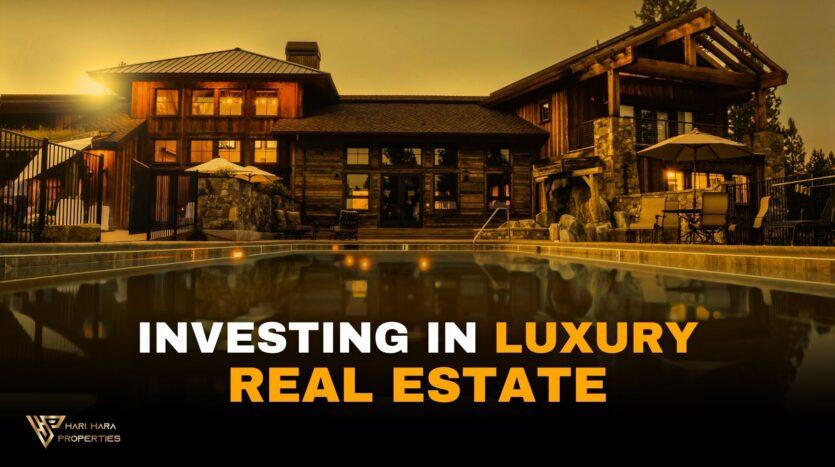Investing in Luxury Real Estate: A Guide for High-Net-Worth Individuals
Thinking about stepping into the world of luxury real estate? It’s not just about stunning homes and lavish lifestyles, but also a smart way to invest your money. Luxury properties, whether it’s a grand mansion or a modern penthouse, combine comfort with financial potential. But before you imagine yourself relaxing by the pool in your private villa, there’s a lot to understand about how these high-end properties can boost both your wealth and lifestyle. In this guide, we’ll walk you through the key points of investing in luxury real estate, why it’s a great choice, and simple strategies to help you succeed.
Let’s explore how luxury real estate can offer the best of both worlds a dream home and a solid investment!
Understanding Luxury Real Estate
Luxury real estate includes properties that stand out due to their prime locations, high-quality materials, exclusive amenities, and bespoke design. These properties come in various forms, from high-end residential homes in affluent neighborhoods, to private estates with extensive grounds and exclusive features like swimming pools and guest houses. There are also luxury vacation homes located in popular tourist destinations, serving as ideal retreats. Additionally, luxury commercial properties, such as upscale retail spaces and hotels, cater to elite clientele and are often found in prime business districts or exclusive resort locations.
Why Invest in Luxury Real Estate?

Investing in luxury real estate can provide several benefits. First, these properties help with wealth preservation, as they tend to maintain or increase their value over time, especially in sought-after areas. Luxury real estate often offers significant capital appreciation due to its scarcity and high demand, making it an attractive option for long-term investment. Additionally, these properties can generate substantial rental income, especially in popular vacation destinations or urban centers, providing a steady stream of passive income. On the personal side, owning luxury real estate enhances your lifestyle with exclusive amenities and prestigious addresses. There are also potential tax advantages, such as deductions on mortgage interest and property taxes, which make luxury real estate an appealing investment.
Key Considerations for Luxury Real Estate Investment
Before making an investment, it’s essential to consider several factors. The location of a property is critical, as prime areas with good infrastructure typically see higher demand and better appreciation potential. Investors should also carefully select the type of luxury property that aligns with their goals, whether it’s a residential home, vacation retreat, or commercial space. Thorough market research is crucial to understanding property values and rental trends in your target area. Financing options should also be explored, including mortgages and private loans, to determine the best way to fund the investment. Lastly, if renting out the property is part of your plan, hiring a professional property manager can make operations more seamless.
Strategies for Successful Luxury Real Estate Investment

To maximize your returns in luxury real estate, diversification is key. Spreading investments across different locations or types of properties can protect you from market fluctuations. It’s important to maintain a long-term perspective, as luxury real estate often requires a longer horizon for significant appreciation. Seeking professional advice from experienced real estate agents, attorneys, and financial advisors can help you navigate the complexities of the luxury market. Conducting thorough due diligence, including property inspections and title searches, is essential to avoid potential issues. Strong negotiation skills will also benefit you when securing favorable terms and prices for your investments.
Lifestyle and Personal Preferences in Luxury Real Estate
When investing in luxury real estate, it’s important to align the property with your lifestyle and personal preferences. Proximity to key amenities like schools, hospitals, and shopping centers should be considered, especially if the property will be your primary residence. Privacy and security are major concerns in the luxury market, so ensure the property offers the level of safety you desire. Outdoor spaces such as gardens, patios, or pools can significantly enhance the quality of life and should be assessed based on your preferences. Additionally, the architectural style of the property, whether modern, classic, or eco-friendly, should reflect your personal taste.
Market Trends and Economic Factors to Watch

Luxury real estate is sensitive to broader economic conditions. Inflation can impact property values and rental income, as rising prices often translate to higher real estate values, but also higher operating costs. Interest rate fluctuations can also affect luxury real estate investments, as they influence borrowing costs and overall property affordability. It’s also crucial to stay updated on government policies, such as tax reforms and zoning regulations, which can have significant implications for luxury property investments.
Property Management and Maintenance Considerations
Proper management of luxury properties is essential to maintaining their value. Maintenance contracts should be in place for regular upkeep, such as landscaping and cleaning, to preserve the property’s appeal. Insurance for luxury homes can be costly, so it’s important to compare premiums and ensure you’re getting the best coverage. Property taxes in luxury areas can be high, so understanding local tax rates and potential exemptions is crucial.
Legal and Regulatory Considerations

Investing in luxury real estate involves navigating various legal and regulatory hurdles. Make sure the property complies with local building codes and regulations, especially if you’re planning to renovate. Environmental regulations may also affect luxury properties, particularly those in coastal or environmentally sensitive areas. If the property is part of your estate planning, consult a tax advisor to understand how inheritance taxes might impact your estate.
Environmental Factors to Consider
As environmental sustainability becomes increasingly important, luxury real estate investors should consider the eco-friendliness of their properties. Assessing energy efficiency and considering upgrades like solar panels or energy-efficient windows can reduce long-term costs. Water conservation technologies can also make a difference, especially in areas prone to water scarcity. Sustainability certifications, such as LEED or BREEAM, can increase a property’s value and appeal to eco-conscious buyers.
Additional Tips for Investing in Luxury Real Estate
Before making a final decision, it’s always a good idea to visit the property in person to get a sense of the neighborhood and the quality of the surroundings. Hiring a professional inspector can help identify any potential issues with the property. Don’t be afraid to negotiate the price, especially in a buyer’s market, as there is often room for flexibility. For those interested in real estate investment without direct property ownership, Real Estate Investment Trusts (REITs) offer an alternative that allows you to invest in luxury properties while avoiding the complexities of management.
By carefully considering these factors and adopting sound investment strategies, you can make informed decisions and maximize returns in the luxury real estate market.
Conclusion
Investing in luxury real estate is not just about owning a beautiful property, it’s about building a secure future while enjoying a premium lifestyle. Whether you’re considering a grand estate or a stylish penthouse, luxury real estate offers a perfect balance of financial growth and personal comfort. By understanding the market, choosing the right property, and applying smart strategies, you can enjoy both the prestige and the benefits that come with such high-end investments. After all, it’s not just about where you live, but how you live. So, let your dream home also be a smart investment!
Frequently Asked Questions
What is luxury real estate, and how is it different from regular real estate?
Why should I invest in luxury real estate?
What are the key factors to consider before investing in luxury real estate?
How does location impact luxury real estate value?
Can I earn rental income from luxury real estate?
What are the risks involved in investing in luxury real estate?
Is luxury real estate a good option for long-term investment?
How can I finance my luxury real estate purchase?
What is the importance of property management in luxury real estate?
How can I maximize returns on my luxury real estate investment?
Investing in real estate can come with various risks, from market fluctuations to property management challenges. At Hari Hara Properties, we ensure that all your property needs are fully taken care of, offering expert guidance and management. With us, you can invest with confidence, knowing that your real estate journey is backed by a team dedicated to minimizing risks and maximizing returns.





